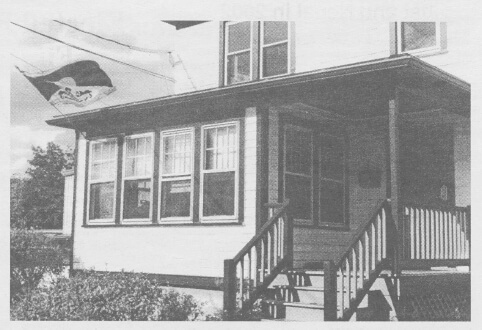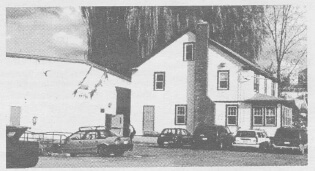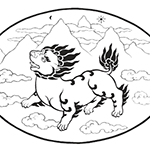| The following article is from the Autumn, 2001 issue of the Snow Lion Newsletter and is for historical reference only. You can see this in context of the original newsletter here. |
BY FRANKLIN CRAWFORD
ITHACA—More than any other medium, books make the greatest contribution to the advancement of the Tibetan cause. Books: Not Hollywood movies, not television; neither newsprint nor magazines nor the innumerable web sites orbiting hyperspace: Books.
That's the opinion of the Dalai Lama himself, expressed during a press conference for Nobel laureates gathered at the University of Virginia in the fall of 1998. Of particular benefit, the Dalai Lama emphasized, were books that portrayed Tibetan culture in a positive light.

The house where Snow Lion's administration and the Ithaca editorial offices are located.
It is perhaps no coincidence that just prior to affirming the power of books, the Dalai Lama was presented with an edition of The Spirit of Tibet, a splendid collection of color photographs given to him by the publishers at Snow Lion.
Such a vote of confidence from Tibet's spiritual and temporal leader, a figure as fixed in the public consciousness as any Hollywood or sports celebrity, was gratifying for the folks at Snow lion, whose sole mission, blessed at the outset by a generous offering from the Dalai Lama, is to preserve and enhance Tibetan culture.
"Snow Lion is seminal—they are crucial in the development of the field of Tibetan studies and to furthering the public's interest in Tibet," said Jeffrey Hopkins of the Religious Studies Department at the University of Virginia, site of the foremost program in Tibetan Buddhist studies in America. "By making texts of various levels of difficulty available to the public in English, Snow lion is the pioneer house in this field."
That house was in a field of dreams just twenty years ago.
Snow Lion was a grassroots, do- it-yourself press founded by Gabriel and Patricia Aiello, a pair of Ithacans whose encounter with the Dalai Lama in 1979 inspired them to take action on behalf of causes Tibetan. But, other than a desire to help the Dalai Lama, the Aiellos knew very little about Tibetan culture. However, they did know Sidney Piburn, and knowing Piburn was like having a 24-hour Tibetologist at their side. A graduate of Cornell University, Piburn had made several trips to Dharamsala, India, the home of Tibet's government-in-exile. In 1974 and 1975, Piburn held a private audience with the Dalai Lama and it was partly through Pibum's efforts that the Dalai Lama made his first visit to the U.S. in 1979.
Piburn, co-founder of Snow Lion, boasts no diplomatic credentials, but his familiarity with things Tibetan won him the confidence of numerous authorities—political as well as scholarly. The Aiellos could have had no better point man in their company when, in 1980, the fledgling publishers met with the Dalai Lama in Toronto to discuss a business plan. At that point Snow Lion was not a purely Tibetan enterprise, but the Aiellos and Piburn wanted Tibetan texts to figure largely in their stock and trade. They sought advice from the Dalai Lama on the best way to go about publishing Tibetan literature and His Holiness was far more than forthcoming. The Dalai Lama suggested a broad list of titles that would appeal to the general public as well as to practicing Buddhists and Tibetan scholars. His advice was well taken and the meeting, apparently winding down, was deemed successful. But the Dalai Lama had a surprise for the Ithaca trio. Without solicitation of any kind, he made a flat-out offer: His 1979 U.S. talks, translated and interpreted by Hopkins, America's master Tibetan scholar, were Snow Lion's for the taking.
The gift was like a mandate from God.
"At that point, Harper and Row wanted the book," said Piburn, who was astonished by the offer. "Here he turns around and gives it to some kids without any funds or experience, in Ithaca, New York."
It would take four years for Snow Lion to publish Kindness, Clarity and Insight, but having the Dalai Lama's imprimatur put the little house on the map. In the mean time, the Aiellos had by personal necessity bowed out of the venture. They turned the entire business over the Piburn. Snow Lion was incorporated and Piburn suddenly found himself promoted from consultant to owner, and his Tibetan Buddhist training put to a stress test as he sweated out the lean years. In 1984, Piburn forged a partnership with Jeff Cox, a friend and associate with a business background and an abiding interest in Eastern religion and Tibetan culture. Together they worked to secure funding and to meet a nose crunching deadline for Kindness, Clarity and Insight. The Dalai Lama was due for his second U.S. tour that autumn and the book was pegged to his arrival. Under pressure, Snow Lion managed to finish the book, which sold 10,000 copies and required three reprints to meet demand. No small task under the circumstances.

"I woke up one morning in 1989 and turned on the radio and learned that the Dalai Lama had won the Nobel Peace Prize," said Piburn. "That changed everything."
The Dalai Lama's book synergized Snow Lion and spared it from an early grave. It was a close call: by the time Kindness, Clarity and Insight came out, Snow Lion's resources were depleted, its thin shelf of eight titles completely out of stock. On the tail winds of Kindness, Clarity and Insight, a growing relationship with Hopkins and the University of Virginia led to three new books and suddenly Snow Lion had momentum.
Cox, who helped to guide Snow Lion from red to black, initiated a free international newsletter, a project that not only boosted Tibet, but helped to spread Snow Lion's name throughout the Tibetan community-at-large.
"Up until then most Tibetan groups in America were disparate—there wasn't a unifying vehicle. The newsletter contained everything Tibetan," said Cox. "Interest in it grew quickly and it became a central force in getting our name out there." In 1987, Snow Lion found an investor and jumped from publishing two or three books a year to publishing more than 10 books annually. Today, Snow Lion produces 20 new titles in a year. The small company's rise paralleled, and even helped stimulate, a passionate global fascination with Tibetan religion, culture and political issues. Long before Tibetan struggles became a Hollywood cause celebe, Snow Lion was reaching an audience of people who normally would not have had access to Tibetan materials. In 1980, there were three Buddhist centers in the U.S.; today there are 500. Tibetan arts groups and performers and Tibetan teachers as well as monks appeared in diverse settings across America These saffron and crimson robed emissaries were a cultural phenomenon that eventually influenced Congress to pass an immigration bill allowing for the Tibetan Resettlement Project of 1989 and 1990.
Just about then, as far as Snow Lion was concerned, all heaven broke loose. Ten years after the Dalai Lama's personal offer galvanized the Snow Lion mission, His Holiness again came to the aid of the determined Ithaca house. This time however, the blessing came through the will of the world.
"I woke up one morning in 1989 and turned on the radio and learned that the Dalai Lama had won the Nobel Peace Prize," said Piburn. "That changed everything."
With 12 Dalai Lama books to their name, Snow Lion's publishers worked furiously to produce The Dalai Lama, A Policy of Kindness. Something of a Dalai Lama primer, it categorized commentary from His Holiness on a variety of general topics. The Dalai Lama, A Policy of Kindness served to portray the Dalai Lama as a worldly-wise, accessible leader of great character and appeal. The text was picked up by the Book-of-the-Month Club and more than 70,000 copies have been sold.
In 1990, Piburn helped arrange a Dalai Lama visit to Cornell University and almost inadvertantly positioned Snow Lion as a primary source for authentic Tibetan texts, from the popular to the esoteric.
Business ran apace and Snow Lion outgrew several locations in downtown Ithaca. Today, with 150 titles and several publishing sidelines such as gift cards and bumper stickers, Snow Lion is housed in a converted warehouse on the city's West End business district with offices in a modest residence next door. Small Tibetan prayer flags hanging outside a freight entrance offer some hint at the doings within, but otherwise the site exhibits little of the exotic.
True to its mission, Snow Lion continues to publish books that would likely never find their way into print.
"They don't abandon a book just because it doesn't sell and that's very, very important," said Hopkins.
And they tackle projects no bottom-line publisher would touch. For instance, the 1,027-page book Fluent Tibetan. Printed in four volumes, with 18 audio tapes and a CD ROM, it runs for $250. It's expensive to produce, but sales of more than 2,000 copies will keep Fluent Tibetan on the shelves for a long time to come.
Snow Lion's commitment—and it's growth—caught the attention of the National Book Network, a first rate North American distribution firm that handles a mix of 80 large and small, mostly independent houses.
"Snow Lion has the best selection of Tibetan materials of anybody in the business," said Victoria Metzger, NBN spokeswoman. "Their growth came from demand, not venture capital investment. That's really nice—and rare—to see in this age of the mega-publisher with huge consolidations and changes in the book selling and publishing market almost every month."
Today Snow Lion employs sixteen people, including four members of the Tibetan community who have settled in Ithaca. Since 1990, Ithaca also has become the site of Namgyal Monastery, a branch of the personal monastery of the Dalai Lama, and the first established in the western hemisphere. Piburn's efforts have figured significantly into the Tibetan resettlement in Ithaca as well as the arrival of Namgyal and the continued success of Snow Lion.

The building where the Snow Lion store, order taking and shipping departments, and warehouse are located, plus another view of the administration house.
Twenty years after a fortuitous meeting with the Dalai Lama sealed its fate, Snow Lion books can be found in stores and libraries throughout the world. There's even a bookstore in Dharamsala that exclusively stocks Snow Lion's publications. Ithacans traveling abroad are surprised to see the Snow Lion name in far flung shops around the globe. In a fiercely comeptitive trade, one that is as vulnerable as any to the ruthless barbarisms of modern commerce, Snow Lion holds its own. Created from a simple desire to help, its success—albeit modest—symbolizes a triumph of compassion over greed. Snow Lion's fate is now subtly interwoven with that of a fragile culture whose very survival is dependent upon the passage of information: undiluted, uncensored, unexpurgated truths bound within the body of knowledge to which books are like vital organs.

